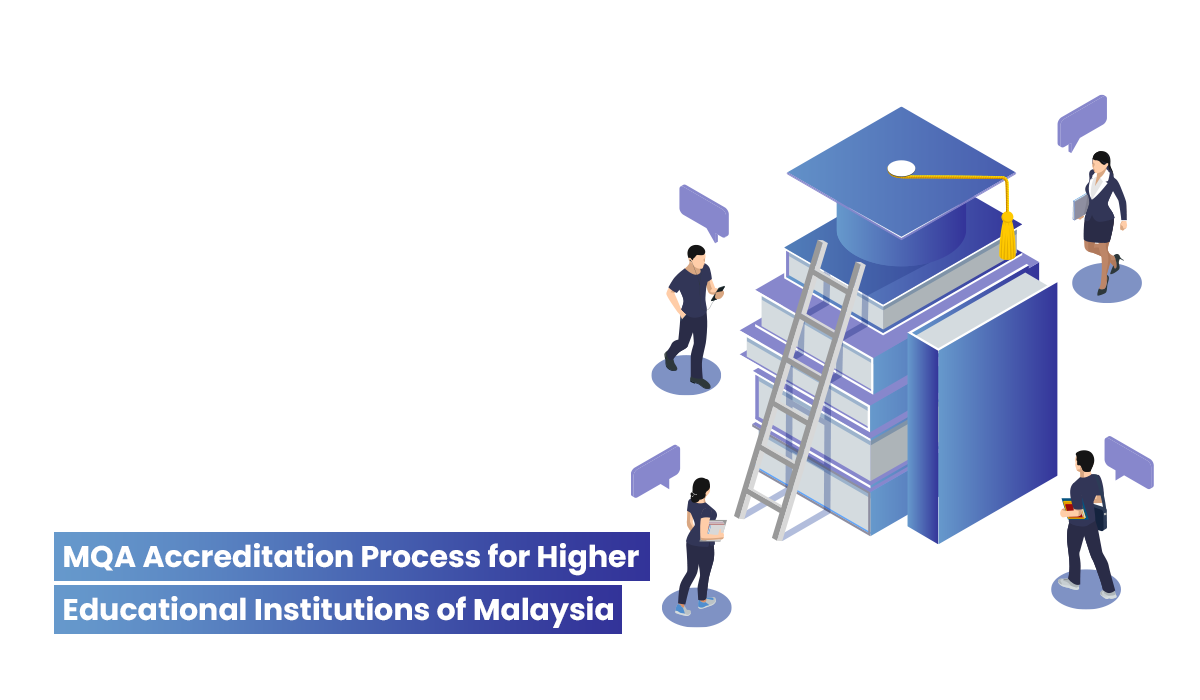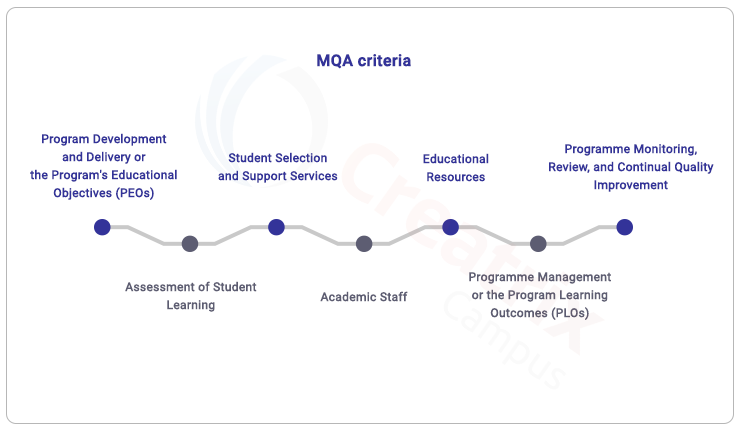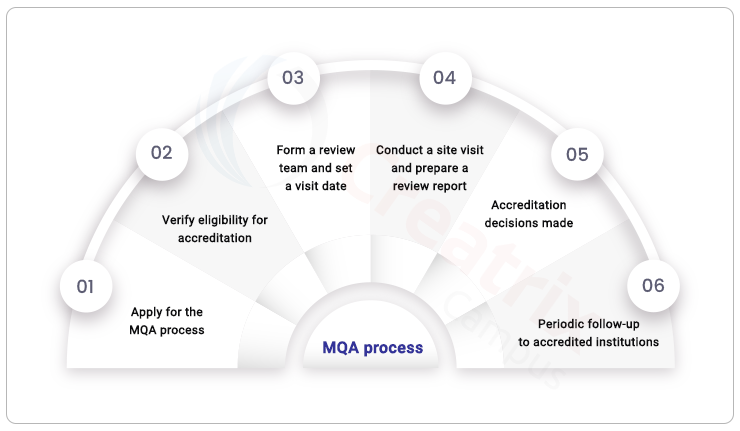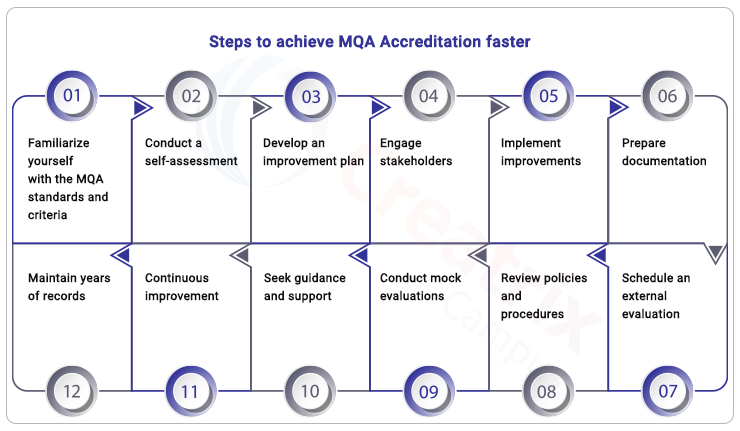A Guide to the MQA Accreditation Process for Higher Educational Institutions

MQA Malaysia oversees the quality assurance and accreditations of HEIs, it is an agency that has established partnerships with over 100 institutions worldwide, it works closely with the Ministry of Education and other stakeholders in Malaysia, and the list is endless.
Welcome to our blog on the MQA Accreditation Process for Educational Institutions! We understand that the process of accreditation can be daunting, which is why we have created this blog to provide guidance and support to educational institutions looking to achieve MQA accreditation. This guide from our team of experts has valuable insights, practical tips, and best practices to help institutions navigate the accreditation process with confidence and ease.
We have covered the various stages of the MQA accreditation process, from initial application to final evaluation, including its benefits, preparation, accreditation visit, and post-accreditation steps in detail. We look forward to accompanying you on this exciting journey toward accreditation success.
The background: higher education Accreditation in Malaysia
The background of higher education accreditation in Malaysia can be traced back to the establishment of the National Accreditation Board (now known as the Malaysian Qualifications Agency or MQA) in 1997. The purpose of MQA was to ensure the quality and standards of higher education in Malaysia and to promote the international recognition and mobility of Malaysian qualifications.
The accreditation process in Malaysia involves a rigorous evaluation of institutions and programs against established standards and criteria, including the quality of teaching, learning, research, governance, and administration. Accreditation is voluntary, but it is increasingly seen as a necessary step for institutions seeking to enhance their reputation and competitiveness in the higher education market.
In Malaysia, there are several types of accreditation, including institutional accreditation, programmatic accreditation, and professional accreditation. Institutional accreditation evaluates the overall quality and performance of an institution, while programmatic accreditation assesses the quality of specific programs or courses.
Professional accreditation is a specialized form of accreditation that is specific to certain professions, such as medicine, engineering, and law. Over the years, the accreditation process in Malaysia has undergone several changes and improvements to better align with international best practices and ensure the quality and relevance of higher education in the country. Today, MQA remains the primary body responsible for accreditation in Malaysia, and its standards and criteria are widely recognized both locally and internationally.
What exactly is the Malaysian Qualifications Agency (MQA)?
The Malaysian Qualifications Agency (MQA) is a statutory body established under the Malaysian Qualifications Act 2007. It is responsible for implementing the Malaysian Qualifications Framework (MQF), which is a unified system of post-secondary qualifications in Malaysia. MQA oversees the quality assurance and accreditation of higher education institutions and programs in Malaysia.
The agency also promotes the international recognition of Malaysian qualifications through partnerships with other countries and international organizations. MQA works closely with the Ministry of Education and other stakeholders to enhance the quality of higher education in Malaysia.
The MQA provides a range of services to institutions, including accreditation, program evaluation, and quality assurance, and is committed to promoting lifelong learning and supporting the development of a skilled and knowledgeable workforce in Malaysia.
Benefits of MQA Accreditation
- Provides assurance to students and employers of the quality of education and qualifications offered by the institution or program.
- Enhances the reputation and credibility of the institution or program.
- Provides a benchmark for the institution or program to measure its performance and identify areas for improvement.
- Encourages continuous improvement and innovation in teaching and learning.
- Facilitates international recognition and mobility of qualifications.
- Enhances opportunities for research collaboration and funding.
- Ensures that the institution or program meets the standards and criteria set by MQA, which are in line with international best practices.
- Provides eligibility for government funding and grants.
- Increases the competitiveness of the institution or program in the higher education market.
- Enhances the employability of graduates from the institution or program.
The MQA accreditation process is a rigorous quality assurance process that evaluates educational institutions and programs based on specific criteria and standards. Accreditation is essential for educational institutions because it provides them with a competitive advantage, improves the quality of education, and enhances their reputation.
The MQA offers several types of accreditation, including:
Full Accreditation
This is the highest level of accreditation offered by the MQA, and it is granted to educational institutions that meet all the criteria and standards set by the MQA.
Conditional Accreditation
This type of accreditation is granted to educational institutions that meet most of the criteria and standards set by the MQA but have some areas that need improvement.
Provisional Accreditation
This type of accreditation is granted to new educational institutions or programs that have not been in operation long enough to meet all the criteria and standards set by the MQA.
MQA standards and criteria

The MQA standards and criteria are a set of guidelines that are used to assess the quality and standard of higher education institutions and programs in Malaysia. They are based on the Malaysian Qualifications Framework (MQF) and cover various aspects of the education system, including the curriculum, teaching and learning, assessment, student support services, research and development, and facilities and resources.
The MQA's quality assurance framework is based on the following seven criteria:
- Program Development and Delivery or the Program Educational Objectives (PEOs): This criterion assesses the extent to which the program's educational objectives are aligned with the needs of the industry and society.
- Assessment of Student Learning: This criterion evaluates the methods used to assess student learning and how well they align with the program's learning outcomes.
- Student Selection and Support Services: This criterion evaluates the methods used to select and support students in the program.
- Academic Staff: This criterion evaluates the academic staff's qualifications, experience, and competence in delivering the program.
- Educational Resources: This criterion evaluates the facilities, infrastructure, and resources available to support the program, including libraries, laboratories, and other support services.
- Programme Management or the Program Learning Outcomes (PLOs): This criterion evaluates the program's learning outcomes and how they align with the program's educational objectives. Programme Monitoring, Review, and Continual Quality Improvement.
In order to achieve MQA accreditation, institutions and programs must demonstrate that they meet the MQA standards and criteria through a rigorous evaluation process. This process includes a self-assessment by the institution or program, followed by an external evaluation by a team of experts appointed by MQA. If an institution or program meets the MQA standards and criteria, it is awarded accreditation, which is a recognition of its quality and excellence in education.
The MQA accreditation process
The MQA accreditation process is designed to ensure that institutions provide high-quality education that meets the needs of students and the community. It is a voluntary process, but accreditation is increasingly seen as a necessary step for institutions seeking to enhance their reputation and competitiveness in the higher education market. Remember, Accreditation also ensures that students receive a quality education that meets international standards, which can be beneficial for their future careers.
Here is the step-by-step process of MQA:

Eligibility assessment
Institutions seeking MQA accreditation must first undergo an eligibility assessment to determine if they meet the minimum criteria for accreditation.
Self-assessment
Institutions must prepare a self-assessment report that provides detailed information about their governance, administration, teaching and learning, research, and community engagement. The report should demonstrate how the institution meets the MQA standards and criteria.
Site visit
MQA will appoint a team of evaluators to conduct a site visit to the institution. The evaluators will assess the institution's facilities, resources, and overall quality. They will also meet with stakeholders such as students, faculty, and industry partners.
Evaluation report
The evaluators will submit an evaluation report to MQA with their findings and recommendations. The report will be used to determine whether the institution meets the MQA standards and criteria for accreditation.
Decision
MQA will make a decision on whether to grant accreditation based on the evaluation report. If accreditation is granted, the institution will receive a certificate of accreditation.
Monitoring and review
Accredited institutions are required to undergo regular monitoring and review to ensure that they continue to meet the MQA standards and criteria.
Appeals process
Institutions that are not satisfied with the decision made by MQA have the right to appeal. The appeals process allows institutions to present their case to an independent panel and request a re-evaluation of their accreditation status.
Preparing for MQA Accreditation

Preparing for MQA accreditation involves a rigorous process of self-assessment and evaluation of the institution or program against the MQA standards and criteria. Here are some steps that institutions can take to prepare for the MQA accreditation:
Familiarize yourself with the MQA standards and criteria
Institutions must first familiarize themselves with the MQA standards and criteria to understand the requirements for accreditation.
Conduct a self-assessment
Institutions should conduct a comprehensive self-assessment to identify areas of strengths and weaknesses in meeting the MQA standards and criteria. This will help them to develop a plan for improvement.
Develop an improvement plan
Based on the self-assessment, institutions should develop an improvement plan to address the identified areas of weakness and improve the quality of education.
Engage stakeholders
Institutions should engage all stakeholders, including faculty members, staff, students, and industry partners, to ensure their support and participation in the accreditation process.
Implement improvements
Institutions should implement the improvement plan and ensure that the changes are aligned with the MQA standards and criteria.
Prepare documentation
Institutions must prepare all necessary documentation, including program outlines, syllabi, assessment plans, and other relevant documents.
Schedule an external evaluation
Institutions must schedule an external evaluation with MQA, where a team of experts will evaluate the institution or program against the MQA standards and criteria.
Review policies and procedures
Institutions should review their policies and procedures to ensure that they are in line with the MQA standards and criteria.
Conduct mock evaluations
Institutions can conduct mock evaluations to simulate the external evaluation process and identify areas for improvement.
Seek guidance and support
Institutions can seek guidance and support from MQA or other accredited institutions to understand the accreditation process and requirements better.
Continuous improvement
Institutions should ensure that they continuously monitor and improve their quality of education even after achieving MQA accreditation.
Maintain years of records
Institutions should maintain records of all their activities related to MQA accreditation, including self-assessment reports, improvement plans, and external evaluation reports.
The MQA Accreditation Visit
The MQA accreditation visit is a critical part of the accreditation process where a team of experts from MQA evaluates an institution or program's compliance with the MQA standards and criteria. The accreditation visit is typically scheduled after an institution has completed a self-assessment and implemented an improvement plan.
The accreditation visit typically involves the following steps:
Entrance Meeting
The accreditation team will meet with the institution's management team to discuss the accreditation process and the institution's performance against the MQA's criteria and standards.
Evaluation
During the accreditation visit, the MQA accreditation team will evaluate the institution or program based on the MQA standards and criteria. The team will review documentation, meet with faculty members, staff, students, and industry partners, and assess the institution or program's facilities, resources, and services.
Exit Meeting
The accreditation team will provide feedback to the institution or program on its compliance with the MQA standards and criteria, including areas of strengths and weaknesses. The team will also identify areas that require improvement and provide recommendations on how the institution or program can improve.
The MQA’s post-accreditation scenario
After the accreditation visit, the MQA accreditation team will prepare an accreditation report, which will be submitted to the MQA Accreditation Committee for review. The committee will review the report and make a recommendation to the MQA Board for accreditation status. The institution must then take the following steps:
Follow-up Actions
If the institution receives conditional or provisional accreditation, it must address the areas identified by the MQA during the evaluation. The institution must develop an action plan to address these areas and implement the plan.
Maintaining MQA Accreditation
Educational institutions must maintain their MQA accreditation by continuing to meet the MQA's criteria and standards. This involves ongoing quality assurance and continuous improvement.
Continuous Improvement
Educational institutions must engage in continuous improvement to ensure that they provide the highest quality of education. This involves regularly reviewing their performance and making improvements based on feedback from stakeholders.
Automate the MQA process with Creatrix Campus Accreditation software
The MQA accreditation process is a rigorous quality assurance process that evaluates educational institutions and programs based on specific criteria and standards. The process involves several steps, including self-assessment, SAR preparation, stakeholder engagement, accreditation visit, and post-accreditation.
Accreditation software, such as Creatrix Campus Accreditation platform, can help institutions manage and automate the MQA accreditation process. The software can provide a platform for institutions to track and manage accreditation requirements, document compliance with MQA standards and criteria, and automate the self-assessment process.
The software can also provide a centralized platform for institutions to manage accreditation-related documents and tasks, such as scheduling the accreditation visit, preparing the accreditation report, and tracking the institution's progress in implementing an improvement plan.
Our accreditation software can help institutions streamline the accreditation process, reduce the administrative burden, and ensure compliance with MQA standards and criteria. It can also provide real-time visibility into the accreditation status, helping institutions stay on track and meet their accreditation deadlines. Schedule a consultation with our accreditation experts and experience a live demo of how our system can automate your MQA process.
Disclaimer: Creatrix Campus can automate the accreditation process with the MQA Accreditation in Malaysia by streamlining and simplifying many of the manual tasks involved. Our software automates many of the manual tasks involved, from tracking and reporting on accreditation-related activities to providing real-time updates on the status of the process. With all relevant information easily accessible in one centralized location, institutions can ensure that they meet all deadlines and requirements. By automating the accreditation process, institutions can save time, reduce the risk of errors, and focus on their core activities to drive success.



